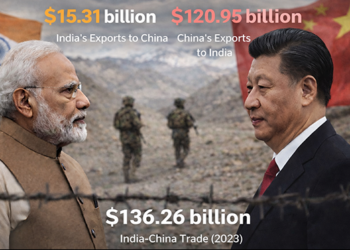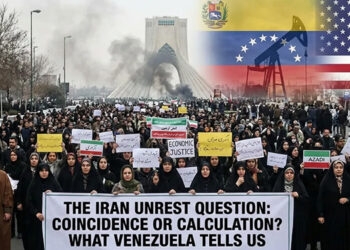India must galvanise its diaspora to champion sovereign interests abroad—much as Israel has successfully done.
The Tweet and the Pitch
On 20 August 2025, Nikki Haley amplified a Newsweek op-ed she co-authored arguing that to counter China the United States must “rebuild” its relationship with India. The core message is twofold. First, Washington should give the partnership more high-level attention—fast—because India is indispensable to re-shoring supply chains, deepening defence cooperation and checking Beijing’s ambitions. Second, she couples that outreach with pressure: India must take U.S. concerns seriously on Russian oil purchases and market access. In other words, India should be treated as a prized democratic partner—but not exempt from tough leverage when U.S. interests are at stake.
Roots, “Genetics,” and Punjabi–Sikh Identity
Haley, born Nimarata “Nikki” Randhawa, is the daughter of Punjabi Sikh immigrants who built a life in the American South. Her upbringing in a tight-knit Punjabi household—tempered by the experience of being visibly different in small-town South Carolina—has long shaped her public story. She later married in both Sikh and Methodist ceremonies and ultimately embraced Christianity, while continuing to acknowledge her Punjabi–Sikh heritage. Those “genetics and extraction,” as Indians sometimes put it, give her an intuitive feel for Indian society and for the diaspora’s aspirations. But they do not dictate her politics.
From Columbia to Turtle Bay—and Beyond
Haley’s political ascent is textbook American: state legislator to two-term governor of South Carolina (2011–2017), then U.S. ambassador to the United Nations under President Donald Trump (January 2017–December 2018), after which she resigned on amicable terms. She entered the 2024 Republican presidential primaries as the most internationally experienced contender in the field, suspended her campaign in March 2024, and now sits in the party’s front rank of 2028 prospects. Throughout, she has cast herself as a hawk on China, a realist on Russia and Iran, and an “America-first internationalist” who favours alliances when they advance U.S. ends.
Where Haley’s Line Has Run Against India
Haley is no India-basher; indeed, she often praises India as a vital democratic partner. Yet there are clear moments where her stance has clashed with New Delhi’s core preferences—and has read to many Indians as plainly unsympathetic. Four broad instances stand out, with a fifth now emerging:
1) Kashmir and third-party “help.”
As U.N. ambassador, Haley signalled that Washington might “find its place” in easing India–Pakistan tensions—language that, in Delhi, inevitably triggers a red line. India’s position is that any issues with Pakistan, including Kashmir, are strictly bilateral. Her comments were walked back by Indian officials, but they revealed a willingness to test fences India considers sacrosanct.
2) Iran sanctions and oil pressure.
During 2018 outreach in Delhi, Haley pressed India to reduce purchases of Iranian crude as the U.S. re-imposed sanctions. For a country acutely sensitive to energy security, the public squeeze—however consistent with U.S. policy—directly cut against India’s immediate interests.
3) Paris climate rhetoric that lumps India with China.
Haley has defended the U.S. exit from the Paris Agreement by arguing it failed to hold “China and India” adequately to account. New Delhi bristles at being bracketed with Beijing on climate obligations, given its per-capita emissions and development stage. While that line plays well in Republican politics, it undercuts one of India’s signature diplomatic platforms.
4) Trade hardball and the “protectionist” tag.
Haley has repeatedly highlighted India’s tariff and non-tariff barriers and endorsed tougher U.S. leverage to secure market access. The economic case is debatable; the political read in Delhi is simple: she is prepared to back tariffs and conditionality if that is what it takes to pry open the Indian market for U.S. goods and standards.
5) The Russia-oil test, revived.
Her latest Newsweek argument couples warm words about India’s strategic value with a pointed insistence that India heed U.S. concerns over Russian crude. She plainly favours rebuilding ties—but on terms that include public, even punitive, pressure when she believes India is enabling Moscow’s wartime revenues.
Reading the Subtext
What unites these episodes is not hostility to India but a consistent hierarchy: U.S. strategic and domestic priorities first, partnership with India where it helps achieve them, and pressure on India where it does not. That hierarchy explains why Haley can, in the same breath, call India essential against China and also urge sharper tools—tariffs, sanctions pressure, climate critique—to force alignment. It also explains her communication style: praise India’s democratic character and economic potential to broaden the coalition at home, while signalling to the Republican base that she will not “go soft” on trade, energy or Russia.
Why the Punjabi and Sikh Diaspora Should Take Note
For emotional Indians abroad—especially Punjabis and Sikhs who take pride in Haley’s heritage—her latest tweet can feel like a homecoming. It is not. Haley’s identity gives her fluency and empathy; it does not convert her into an “India lobbyist.” On issues where New Delhi’s choices collide with the priorities of a Republican White House—Russia policy, tariff schedules, data localisation, or climate burdens—expect her to push, publicly if needed. On issues where interests align—such as Indo-Pacific deterrence, defence technology cooperation, and trusted supply chains—expect strong advocacy and real momentum.
The Realpolitik Balance Sheet
From India’s vantage point, the Haley proposition is a classic deal: deeper defence and tech cooperation, faster trade-offs on supply chains and standards, and more political attention in Washington—balanced by sharper scrutiny of India’s energy sourcing, market openness and multilateral voting patterns. Crucially, this sits within the wider framework of the QUAD partnership—India, the U.S., Japan and Australia—which has emerged as a bulwark against China’s expansionist ambitions in the Indian Ocean and its Belt and Road initiatives across Asia and beyond. For the diaspora, the message is, therefore, to convert pride into prudence: leverage the cultural connection to widen channels, but measure her by outcomes, not sentiment.
In Summary: Welcome the Tweet-But Keep Your Guard Up
Haley’s latest posture is best read as recalibration, not conversion. She is trying to steer Donald Trump’s agenda toward embracing India as the indispensable bulwark against China—and to discipline Indian choices that, in her view, undermine U.S. aims. We should therefore resist reading her tweet and op-ed as a pledge of consistent pro-India mission. They reflect her domestic politics and priorities at a particular moment. By all means, welcome the tone and seize the openings it creates. But there is no reason to assume she will be an all-weather friend of the Republic of India—irrespective of her Punjabi–Sikh “genetics and extraction”—when those priorities pull in a different direction.
India’s Diplomatic Task Ahead
India’s diplomatic corps, under the seasoned leadership of External Affairs Minister Dr. S. Jaishankar and fully backed by Prime Minister Narendra Modi, must continue deep engagements with partners across the globe. Yet, in parallel, India must galvanise its diaspora to champion sovereign interests abroad—much as Israel has successfully done. This requires tapping far more strategically into Indian communities in the United States and Canada, not just for grievance redressal at home but to articulate India’s concerns in Washington and Ottawa. This is what I realised during my current visit to the U.S., which I wind up next week. NRI forums should not be confined to serving as grievance-ventilation platforms; those functions are important, but they are not enough.
The Indian diaspora—especially the Silicon Valley professionals, with their credibility in technology, innovation, and venture capital, and their unmatched access to America’s policy elite—must be mobilised as ambassadors of India’s perspective. Our think-tanks abroad, both formal and informal, and the wide range of Indian associations should be reorganised not on BJP-versus-Congress lines, but on a unifying refrain of being pro-India. Only then will the Indian perspective avoid being drowned in the noisy squawk box of American cable television, where a U.S. Treasury Secretary can casually accuse India of “profiteering” and taking “windfall gains” from discounted Russian oil. For India, the lesson is clear: diplomatic muscle must be paired with diaspora articulation to ensure its voice carries real weight in the American debate.
(This article first appeared on the author’s blog KBS Chronicles.)







